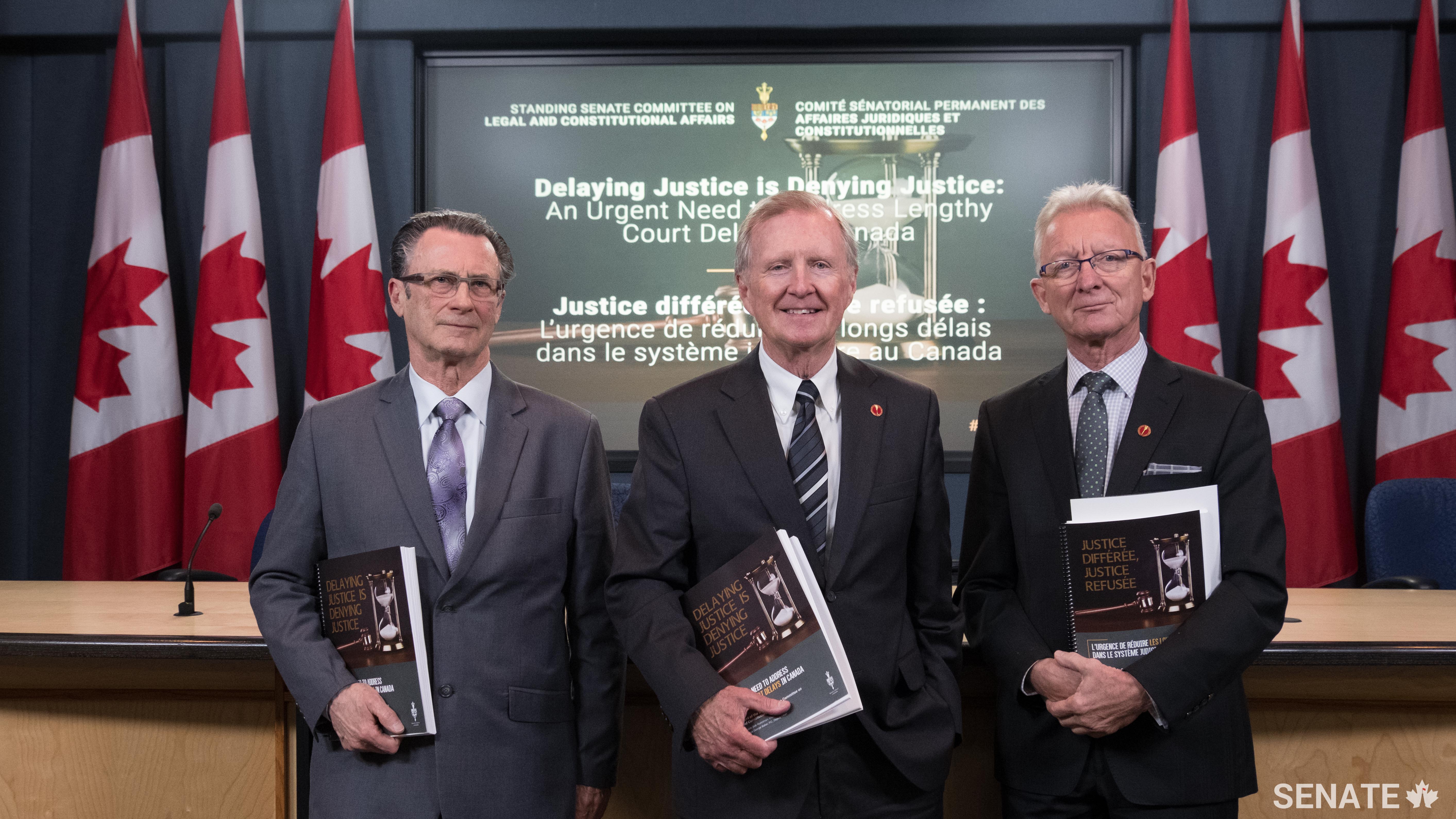Restoring justice to Canada’s clogged courts system

Offenders found guilty of heinous crimes like murder or child sexual assault can have, and recently have had, their convictions totally erased and can roam Canada’s streets with impunity as a direct result of court rulings that their trials took too long to complete. Similarly, persons accused of those same crimes can have their charges dropped because their trials would take too long to complete.
Meanwhile, courts are packed with accused persons suffering from addiction and mental health issues, and there are insufficient resources to allow Indigenous accuseds — already grossly overrepresented in Canada’s jails and prisons — to get the support the law demands they receive.
Change is desperately needed.
After an extensive review and hearings across Canada involving interviews with judges at all levels of court, Crown lawyers, defence lawyers, the police and those affected directly by the criminal justice system, the Senate Committee on Legal and Constitutional Affairs has released a comprehensive report with 50 recommendations to alleviate the strain on our court system.
Court delays have been a problem for decades but a 2016 decision from the Supreme Court of Canada brought matters to a head with the establishment of time limits for cases from the laying of charges to the end of trial. Delay exceeding these limits is presumed to be unreasonable and a violation of an accused’s right under the Canadian Charter of Rights and Freedoms to be tried within a reasonable time.
The Supreme Court allowed for so-called “transitional provisions” before the full implementation of the time limits to prevent a massive number of stays from taking effect. These provisions run out for provincial courts in January 2018, at which time the flood gates will open for tens of thousands of stays — unless the federal government acts on the committee’s recommendations.
Under Canadian law, a stay of proceedings is the only remedy available to a court which finds a breach of the Charter right to be tried within a reasonable time. The committee concludes that the entry of stays of proceedings for those persons already convicted of a heinous crimes like murder or child sexual assault — or who have been charged but whose trials have not been completed — shocks the conscience of the Canadian community and brings the administration of justice into disrepute.
The committee has concluded that stays should not be the only remedy available for unreasonable delays, and recommends that remedies like adjusting sentences and allowing for costs be codified. The committee recommends that the Attorney General of Canada refer these proposed changes to the Supreme Court to confirm their constitutionality.
Other key recommendations include:
- The lack of robust case management is perhaps the most significant cause of delays. Judges need to improve case management, for instance by imposing deadlines and challenging unnecessary adjournments.
- Judicial vacancies are needlessly contributing to delays. The federal government should appoint Superior Court judges on the day of retirement of a judge.





Related articles
Tags
Committee news
Restoring justice to Canada’s clogged courts system

Offenders found guilty of heinous crimes like murder or child sexual assault can have, and recently have had, their convictions totally erased and can roam Canada’s streets with impunity as a direct result of court rulings that their trials took too long to complete. Similarly, persons accused of those same crimes can have their charges dropped because their trials would take too long to complete.
Meanwhile, courts are packed with accused persons suffering from addiction and mental health issues, and there are insufficient resources to allow Indigenous accuseds — already grossly overrepresented in Canada’s jails and prisons — to get the support the law demands they receive.
Change is desperately needed.
After an extensive review and hearings across Canada involving interviews with judges at all levels of court, Crown lawyers, defence lawyers, the police and those affected directly by the criminal justice system, the Senate Committee on Legal and Constitutional Affairs has released a comprehensive report with 50 recommendations to alleviate the strain on our court system.
Court delays have been a problem for decades but a 2016 decision from the Supreme Court of Canada brought matters to a head with the establishment of time limits for cases from the laying of charges to the end of trial. Delay exceeding these limits is presumed to be unreasonable and a violation of an accused’s right under the Canadian Charter of Rights and Freedoms to be tried within a reasonable time.
The Supreme Court allowed for so-called “transitional provisions” before the full implementation of the time limits to prevent a massive number of stays from taking effect. These provisions run out for provincial courts in January 2018, at which time the flood gates will open for tens of thousands of stays — unless the federal government acts on the committee’s recommendations.
Under Canadian law, a stay of proceedings is the only remedy available to a court which finds a breach of the Charter right to be tried within a reasonable time. The committee concludes that the entry of stays of proceedings for those persons already convicted of a heinous crimes like murder or child sexual assault — or who have been charged but whose trials have not been completed — shocks the conscience of the Canadian community and brings the administration of justice into disrepute.
The committee has concluded that stays should not be the only remedy available for unreasonable delays, and recommends that remedies like adjusting sentences and allowing for costs be codified. The committee recommends that the Attorney General of Canada refer these proposed changes to the Supreme Court to confirm their constitutionality.
Other key recommendations include:
- The lack of robust case management is perhaps the most significant cause of delays. Judges need to improve case management, for instance by imposing deadlines and challenging unnecessary adjournments.
- Judicial vacancies are needlessly contributing to delays. The federal government should appoint Superior Court judges on the day of retirement of a judge.







